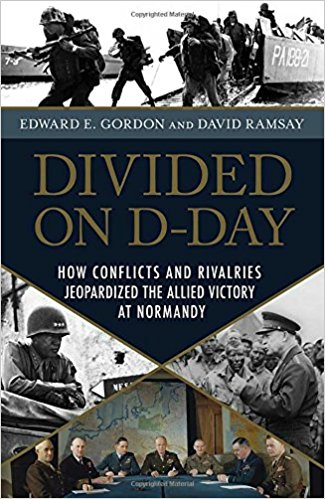
Finest Hour 178
Books, Arts, & Curiosities – A House Divided

March 21, 2018
Finest Hour 178, Fall 2018
Page 48
Review by Richard A. McConnell
Edward E. Gordon and David Ramsay, Divided on D-Day: How Conflicts and Rivalries Jeopardized the Allied Victory at Normandy, Prometheus Books, 2017, 461 pages, $26. ISBN: 978–1633883192
Richard A. McConnell is a retired US Army officer and Associate Professor in the Department of Army Tactics at the US Army Command and General Staff College.
“Unresolved crises in command were among the factors that prolonged the war in Europe for another nine months and produced an estimated 500,000 additional casualties. The Allied leaders could and should have done better.”

2024 International Churchill Conference
Thus Edward E. Gordon and David Ramsay state the thesis of their new book Divided on D-Day. Some might view this assertion with skepticism. This thought-provoking narrative, however, describing the numerous challenges faced by the leaders of Operation Overlord provides a significant amount of evidence to support the authors’ argument.
While many may have gained an almost romantic view of D-Day, Gordon and Ramsay depict the epic struggle as first and foremost a human endeavor, with all the associated blemishes and virtues. Quite rightly the authors reflect on the sources of the conflicts between Overlord leaders that may have caused challenges leading up to and throughout the execution of the operation.
The key elements of this book are the intricate portraits drawn of the D-Day leaders, ranging from General Eisenhower to Air Chief Marshal Sir Arthur Tedder and Admiral Sir Bertram Ramsay. David Ramsay is in fact Admiral Ramsay’s son, but this in no way has clouded his objectivity. The authors provide fair and evenhanded assessments of all the leaders they describe.
One of the most perpetually interesting leadership comparisons of the Second World War is the contrast between Generals Montgomery and Patton. Gordon and Ramsay draw a fascinating picture. Montgomery was an excellent planner with a meticulous mind, characteristics useful for preparing and executing set-piece battles, but which prevented him from readily grasping emerging opportunities in the fluid environment of combat. In contrast, Patton was also a gifted military planner but truly flourished in the environment of uncertainty characterized by his own fast-moving version of blitzkrieg. Gordon and Ramsay make a reasoned argument that the differences in these two key leaders and the allied failure to apply their capabilities appropriately substantively affected the length of the war and the number of casualties. The authors believe that if Patton had been unleashed, the war would have ended sooner. Instead, Montgomery’s cautiousness prolonged matters. For example, Montgomery liked to “tidy up” the battlefield before moving on to the next phase of an operation. Patton liked to keep his opponent off balance by ratcheting up the tempo and seizing opportunities quickly, which was anything but tidy.
A good example of opportunities missed is that at one point, Patton could have advanced into Germany as early as September 1944. Eisenhower instead elected to allow Montgomery to attack north into Belgium with the intent of seizing the port of Antwerp. Montgomery failed to exploit that opportunity by seizing the port but not its entry canal, thus delaying the opening of Antwerp by sixty days.
The level of detail given and the quality of sources utilized are excellent, including an exhaustive review of personal journals, operational reports, historical expert testimony, and thirty outstanding maps. One of the most engaging portions of the book is in the last chapter, where the views of German generals are introduced that tend to support the arguments of Gordon and Ramsay. The inclusion of new sources, such as the personal journals and correspondence of Admiral Ramsay, gives this account of a familiar subject a fresh and personal perspective. If these political and military leaders of the past could succeed with this much internal conflict and still prevail, perhaps we can today.
Subscribe
WANT MORE?
Get the Churchill Bulletin delivered to your inbox once a month.


